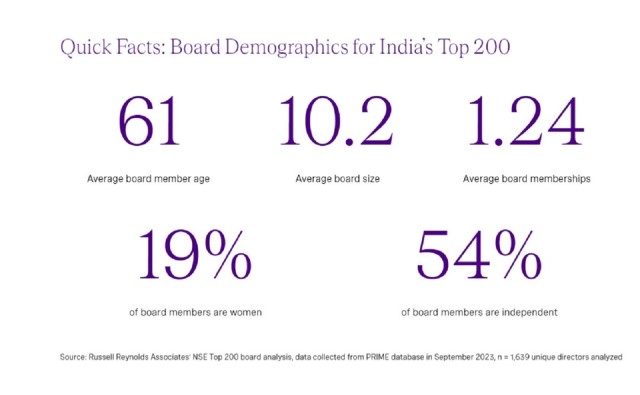INDIA: Russell Reynolds Associates (RRA), a global leadership advisory and executive search firm, has released a report titled “Deciphering the Indian Boardroom,” which examines the board demographics of India’s top 200 NSE-listed corporations. The report reveals that only 54% of directors are classified as independent, trailing significantly behind the robust independence observed in the FTSE 100 (73%) and the S&P 100 (86%).
Despite India’s early adoption of gender quotas, the report starkly illustrates that women occupy a mere 19% of board seats in the top 200 NSE-listed companies. This pronounced gender disparity, particularly in comparison to global counterparts like the FTSE 100 where women hold 42% of board seats, signifies a substantial opportunity for improving the metrics and not sticking to regulatory norms only.
The report highlights a positive trend in the inclusion of external women directors, propelled by regulatory mandates requiring at least one independent woman director on listed boards. While women comprise 27% of independent directors, they constitute only 10% of executive directors, pointing to the need to structurally address gender diversity issues in corporations to provide more opportunities for women to rise to the Board.
Sanjay Kapoor, a consultant at Russell Reynolds Associates, said, “The ‘Deciphering the Indian Boardroom’ report serves as a strategic compass for Indian boards, outlining the roadmap for both present and future boardrooms. Good governance is an ever-evolving process, and snapshots like these allow relevant cross-country comparisons, triggering aspirations to ‘better the best’.“
The report also exemplifies the age dynamics of board members in India, highlighting a shift towards hiring younger talent. With women board members in the top 200 companies averaging 59 years compared to their male counterparts at 62, it appears that women are joining Boards at a younger age than their male counterparts. Further, while the average age of board members is 61 years, the range spreads between 26 to 94 years.
The report emphasizes the need for increased gender diversity in India’s corporate boards, with women’s leadership access being a crucial factor in achieving gender parity and aligning with global governance practices. The full report is available on the Russell Reynolds Associates website.

